Memoir of John Shakespear Bartley, 1916-1919 - Part 11
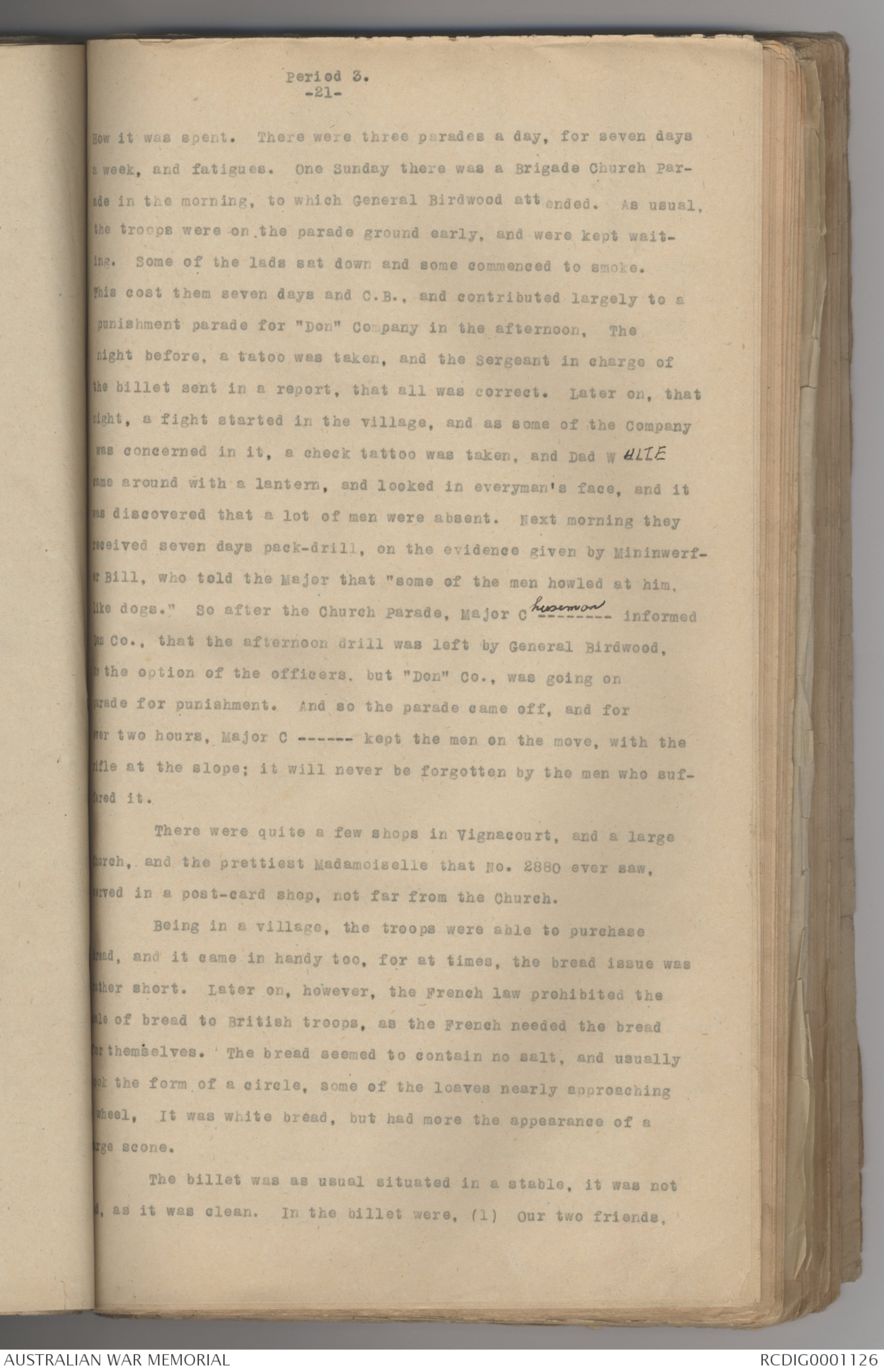
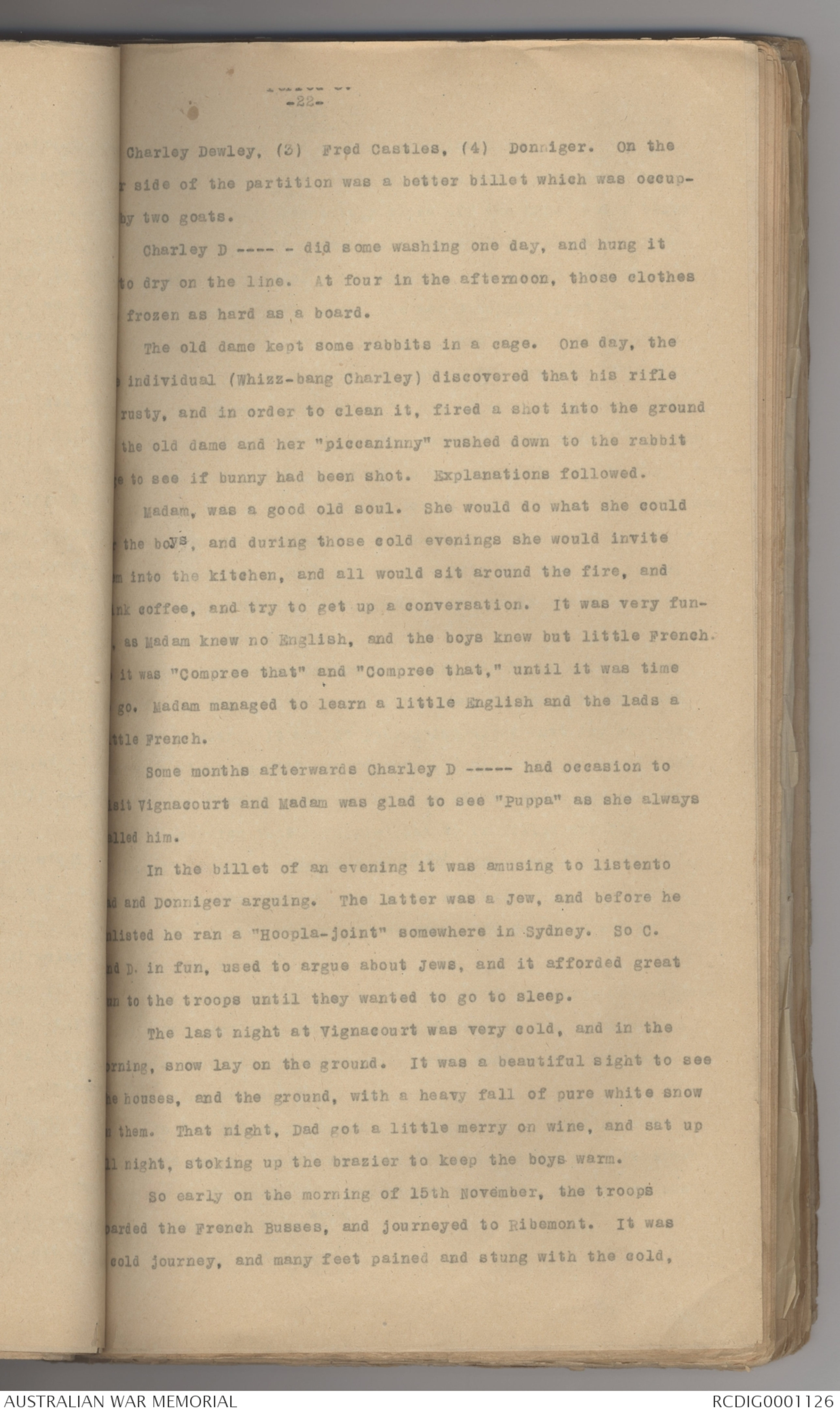
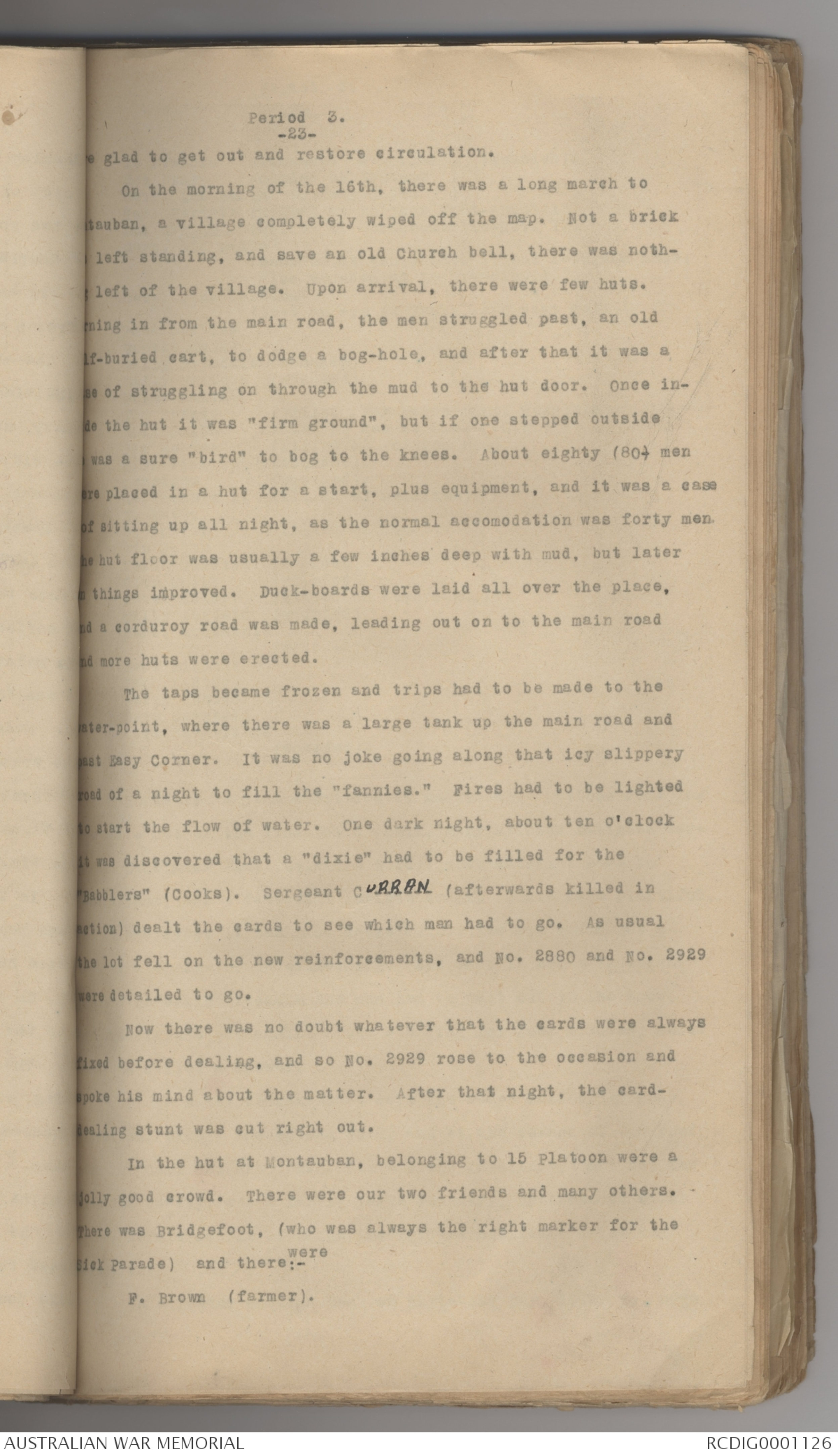
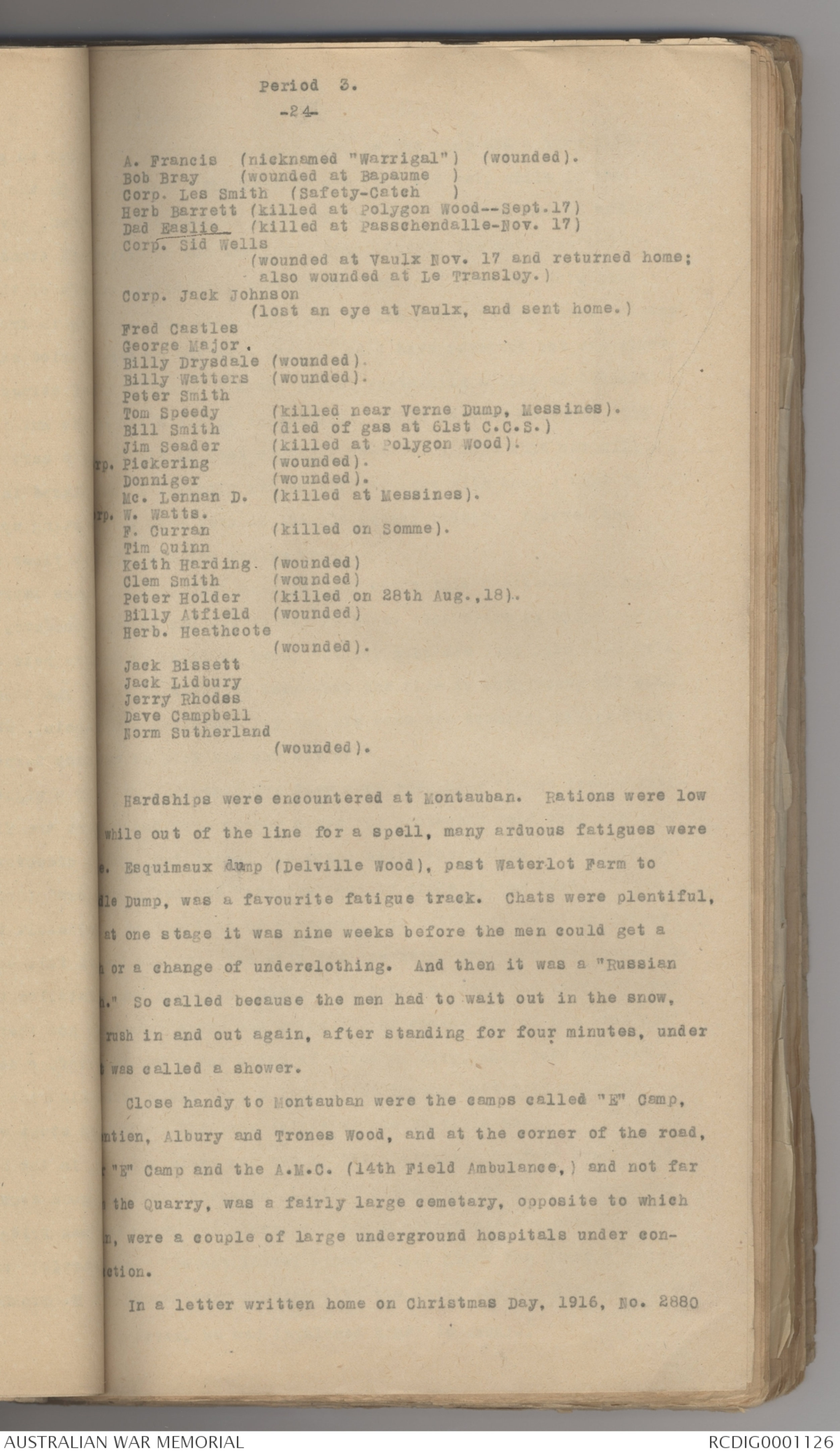
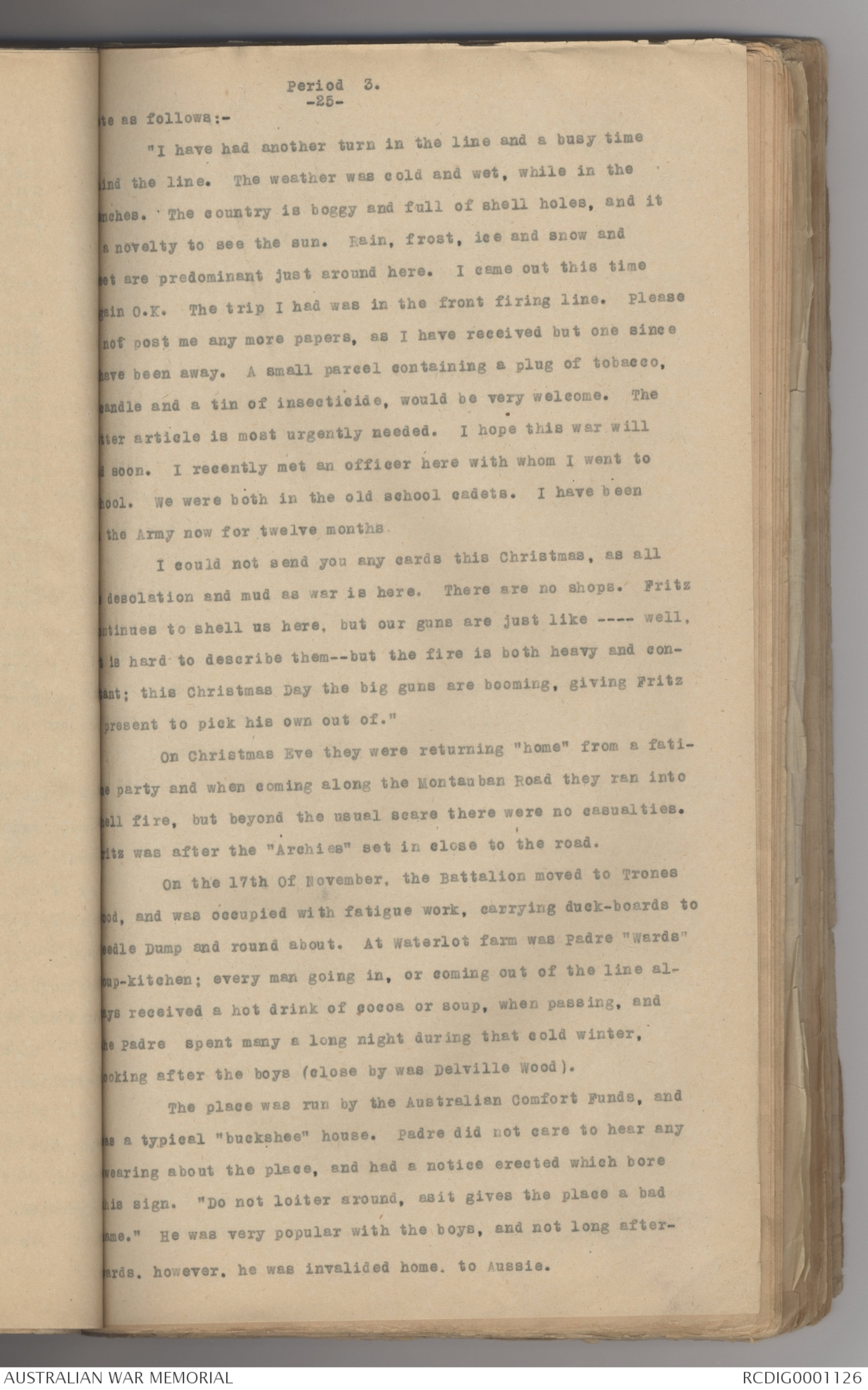
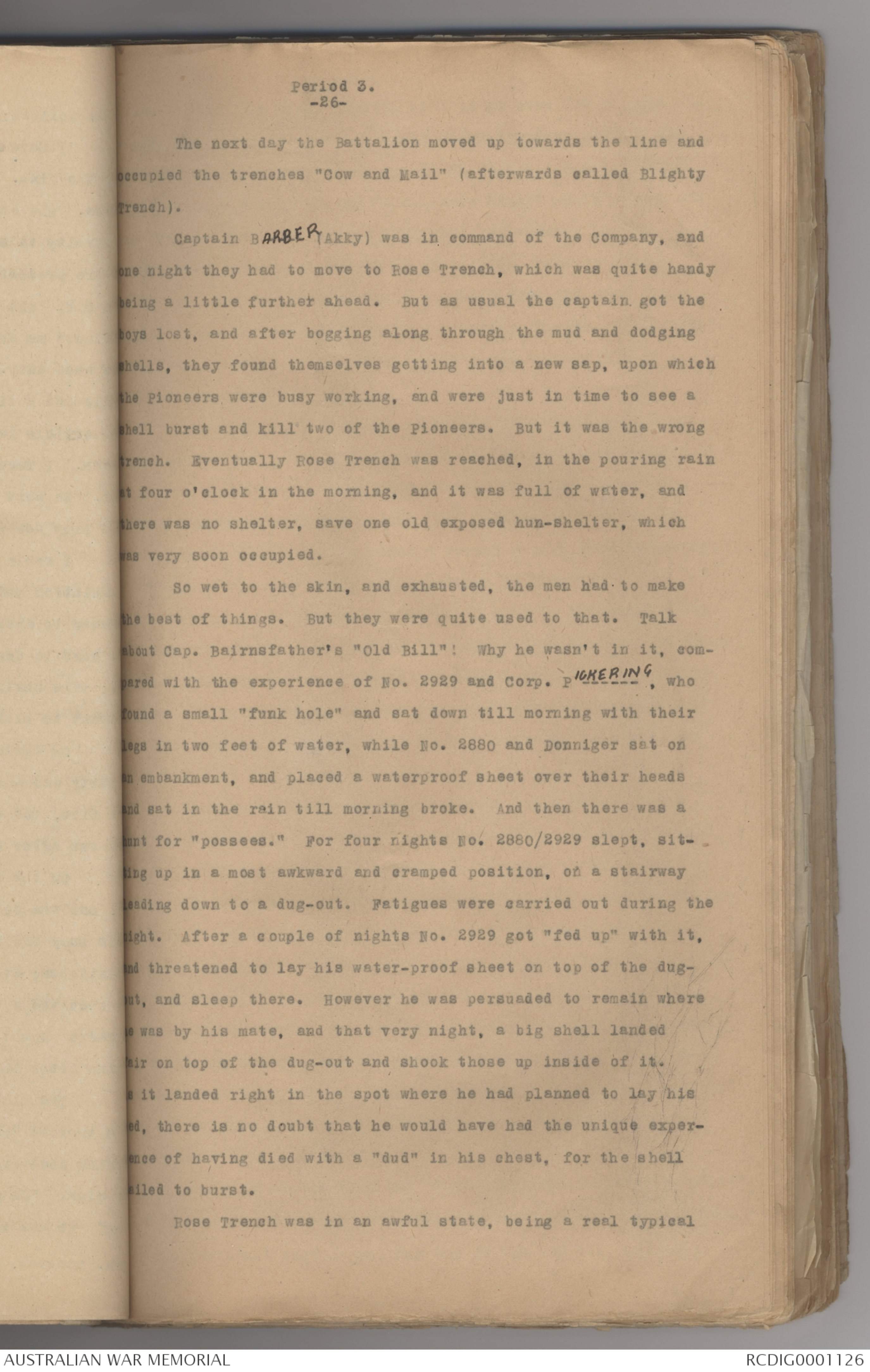
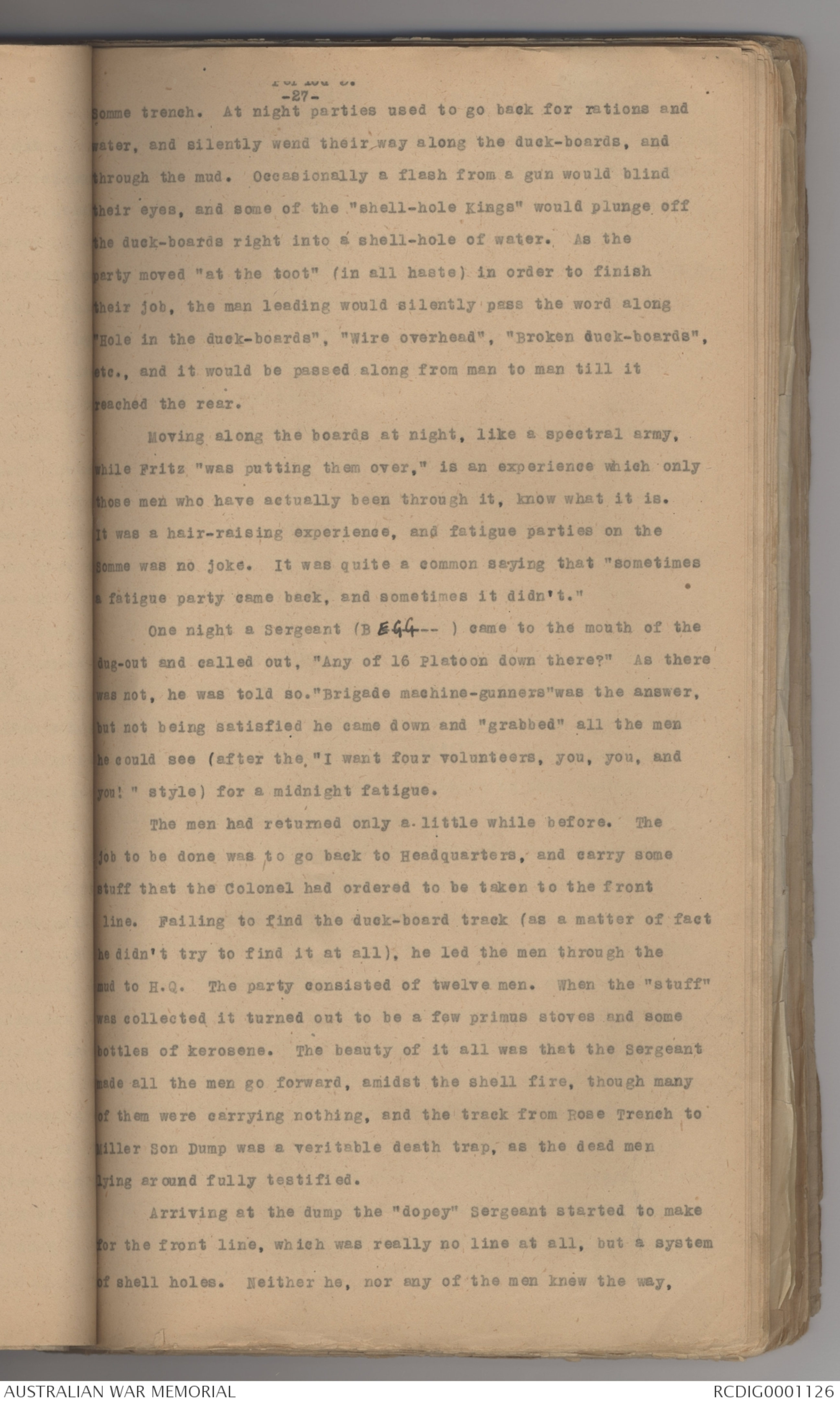
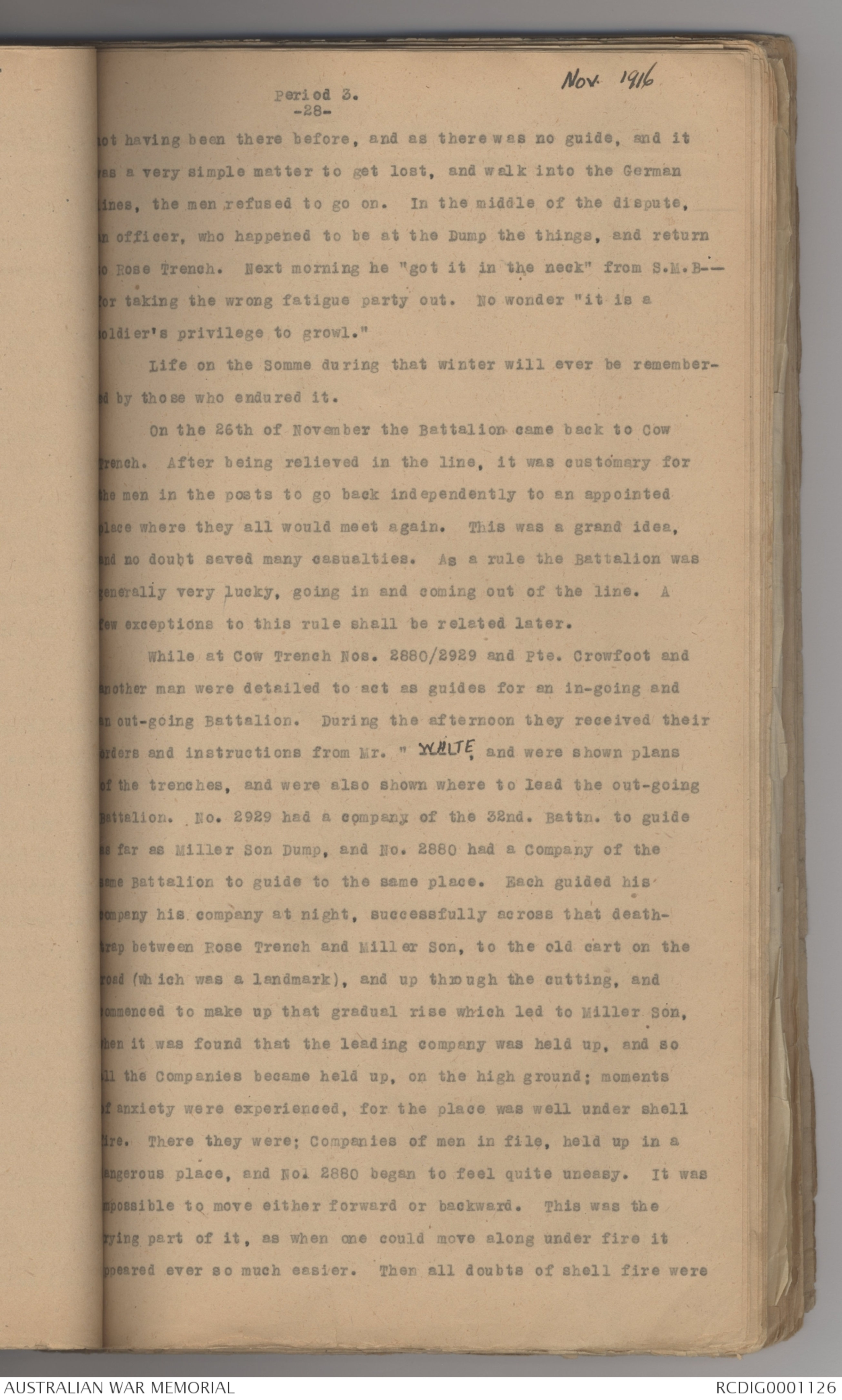
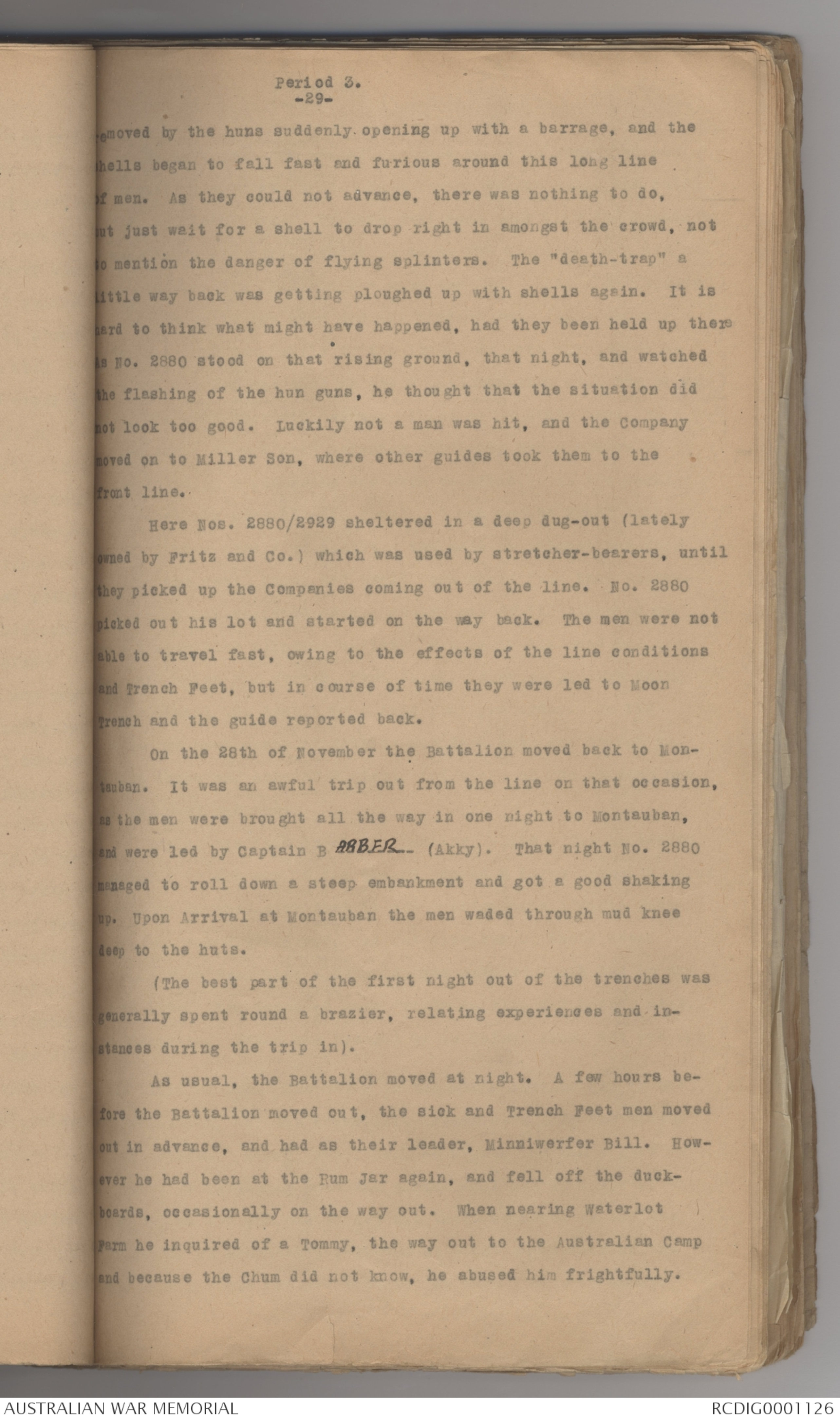
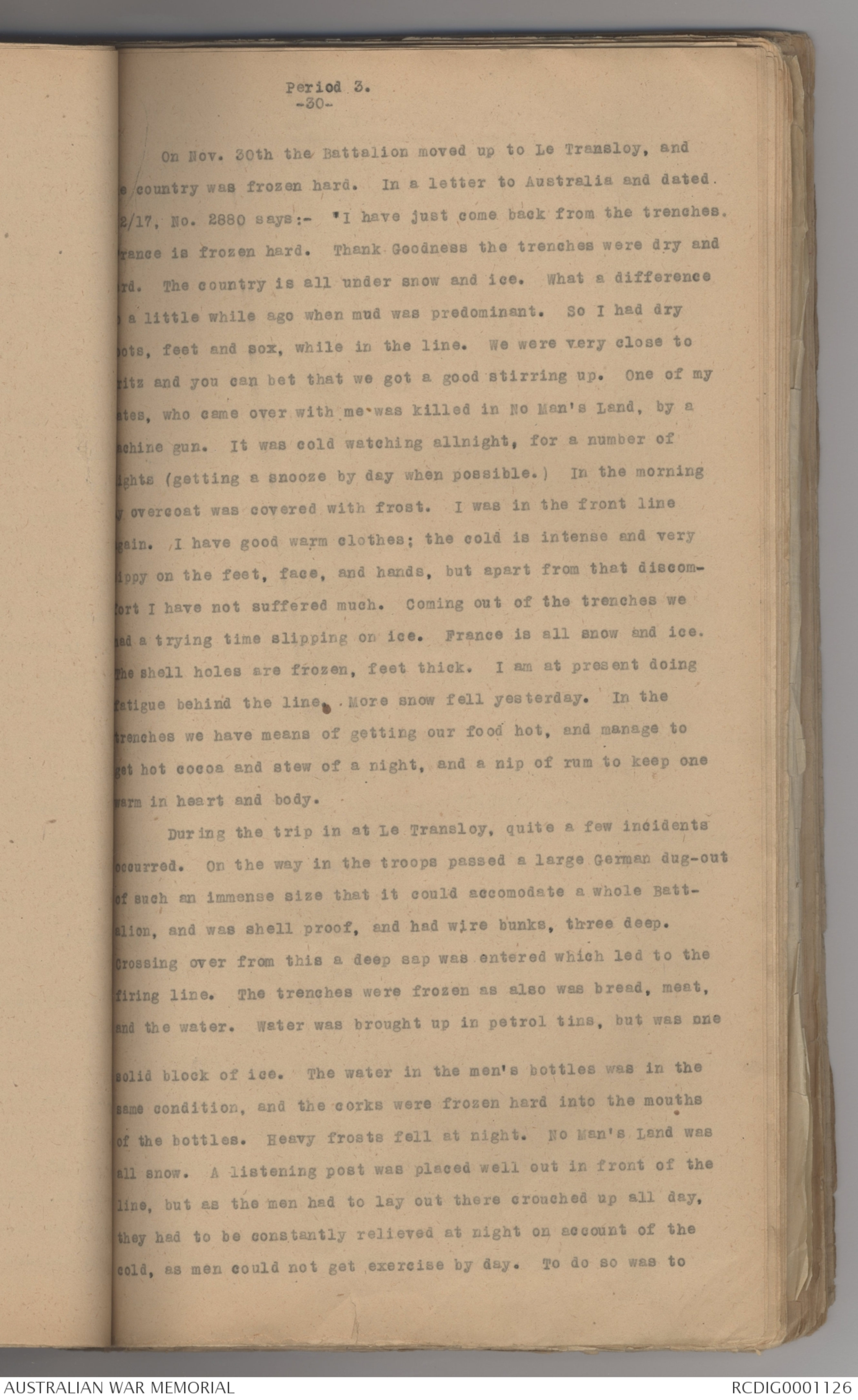
Period 3.
-21-
how it was spent. There were three parades a day, for seven days
week, and fatigues. One Sunday there was a Brigade Church Parade
in the morning, to which General Birdwood attended. As usual
the troops were on the parade ground early, and were kept waiting.
Some of the lads sat down and some commenced to smoke.
This cost them seven days and C.B., and contributed largely to a
punishment parade for "Don" Company in the afternoon. The
night before, a tatoo was taken, and the Sergeant in charge of
the billet sent in a report, that all was correct. Later on, that
night, a fight started in the village, and as some of the Company
was concerned in it, a check tattoo was taken, and Dad WHITE
came around with a lantern, and looked in everyman's face, and it
was discovered that a lot of men were absent. Next morning they
received seven days pack-drill, on the evidence given by Mininwerfer
Bill, who told the Major that "some of the men howled at him,
like dogs." so after the Church parade, Major Cheeseman informed
his Co., that the afternoon drill was left by General Birdwood,
to the option of the officers, but "Don" Co., was going on
parade for punishment. And so the parade came off, and for
for two hours, Major C –----- kept the men on the move, with the
rifle at the slope; it will never be forgotten by the men who suffered
it.
There were quite a few shops in Vignacourt, and a large
church, and the prettiest Madamoiselle that No. 2880 ever saw.
served in a post-card shop, not far from the Church.
Being in a village, the troops were able to purchase
bread, and it came in handy too, for at times, the bread issue was
rather short. Later on, however, the French law prohibited the
sale of bread to British troops, as the French needed the bread
themselves. The bread seemed to contain no salt, and usually
took the form of a circle, some of the loaves nearly approaching
wheel, It was white bread, but had more the appearance of a
large scone.
The billet was as usual situated in a stable, it was not
bad as it was clean. In the billet were, (1) Our two friends,
Period 3
-22-
Charley Dewley, (3) Fred Castles, (4) Donniger. On the
r side of the partition was a better billet which was occupied
by two goats.
Charley D.-- - did some washing one day, and hung it
to dry on the line. At four in the afternoon, those clothes
frozen as hard as a board.
The old dame kept some rabbits in a cage. One day, the
individual (Whizz-bang Charley) discovered that his rifle
rusty, and in order to clean it, fired a shot into the ground
the old dame and her "piccaninny" rushed down to the rabbit
cage to see if bunny had been shot. Explanations followed.
Madam, was a good old soul. She would do what she could
for the boys, and during those cold evenings she would invite
them into the kitchen, and all would sit around the fire, and
drink coffee, and try to get up a conversation. It was very funny -
as Madam knew no English, and the boys knew but little French.
it was "Compree that" and "Compree that," until it was time
go. Madam managed to learn a little English and the lads a
little French.
Some months afterwards Charley D --- had occasion to
visit Vignacourt and Madam was glad to see "Puppa" as she always
called him.
In the billet of an evening it was amusing to listento
[[?]] and Donniger arguing. The latter was a Jew, and before he
enlisted he ran a "Hoopla-joint" somewhere in Sydney. So C.
and D. in fun, used to argue about Jews, and it afforded great
fun to the troops until they wanted to go to sleep.
The last night at Vignacourt was very cold, and in the
morning, snow lay on the ground. It was a beautiful sight to see
the houses, and the ground, with a heavy fall of pure white snow
on them. That night. Dad got a little merry on wine, and sat up
all night, stoking up the brazier to keep the boys warm.
So early on the morning of 15th November, the troops
boarded the French Busses, and journeyed to Ribemont. It was
cold journey, and many feet pained and stung with the cold,
Period 3.
-23-
glad to get out and restore circulation.
On the morning of the l6th, there was a long march to
Montauban, a village completely wiped off the map. Not a brick
left standing, and save an old Church bell, there was nothing
left of the village. Upon arrival, there were few huts.
Coming in from the main road, the men struggled past, an old
half-buried cart, to dodge a bog-hole, and after that it was a
case of struggling on through the mud to the hut door. Once inside
the hut it was "firm ground", but if one stepped outside
was a sure "bird" to bog to the knees. About eighty (80) men
were placed in a hut for a start, plus equipment, and it was a case
of sitting up all night, as the normal accomodation was forty men.
The hut floor was usually a few inches deep with mud, but later
things improved. Duck-boards were laid all over the place.
and a corduroy road was made, leading out on to the main road
and more huts were erected.
The taps became frozen and trips had to be made to the
water-point, where there was a large tank up the main road and
past Easy Corner. It was no joke going along that icy slippery
road of a night to fill the "fannies." Fires had to be lighted
to start the flow of water. One dark night, about ten o'clock
it was discovered that a "dixie" had to be filled for the
"Babblers" (Cooks). Sergeant CURRAN (afterwards killed in
action) dealt the cards to see which man had to go. As usual
the 1st fell on the new reinforcements, and No. 2880 and No. 2929
were detailed to go.
Now there was no doubt whatever that the cards were always
fixed before dealing, and so No. 2929 rose to the occasion and
spoke his mind about the matter. After that night, the card-
dealing stunt was cut right out.
In the hut at Montauban, belonging to 15 Platoon were a
jolly good crowd. There were our two friends and many others.
There was Bridgefoot, (who was always the right marker for the
Sick Parade) and there were:-
F. Brown (farmer).
Period 3.
-24-
A. Francis (nicknamed "Warrigal") (wounded).
Bob Bray (wounded at Bapaume)
Corp. Les Smith (Safety-Catch)
Herb Barrett (killed at Polygon Wood--Sept. 17)
Dad Easlie (killed at Passchendalle-Nov. 17)
Corp. Sid Wells
(wounded at Vaulx Nov. 17 and returned home:
also wounded at Le Transloy.)
Corp. Jack Johnson
(lost an eye at Vaulz, and sent home.)
Fred Castles
George Major
Billy Drysdale (wounded)
Billy Watters (wounded).
Peter Smith
Tom Speedy (killed near Verne Dump, Messines).
Bill Smith (died of gas at 6lst C.C.S.)
Jim Seader (killed at Polygon Wood):
Corp. Pickering (wounded).
Donniger (wounded)
Mc. Lennan D. (killed at Messines).
Corp. W. Watts.
F. Curran (killed on Somme).
Tim Quinn
Keith Harding (wounded)
Clem Smith (wounded)
Peter Holder (killed on 28th Aug., 18).
Billy Atfield (wounded)
Herb. Heathcote
(wounded).
Jack Bissett
Jack Lidbury
Jerry Rhodes
Dave Campbell
Norm Sutherland
(wounded).
Hardships were encountered at Montauban. Rations were low
While out of the line for a spell, many arduous fatigues were
Esquimaux dump (Delville Wood), past Waterlot Farm to
Dump, was a favourite fatigue track. Chats were plentiful,
at one stage it was nine weeks before the men could get a
or a change of underclothing. And then it was a "Russian
So called because the men had to wait out in the snow.
The rush in and out again, after standing for four minutes, under
was called a shower.
Close handy to Montauban were the camps called "E" camp.
ntien, Albury and Trones Wood, and at the corner of the road,
of "E" Camp and the A.M.C. (14th Field Ambulance,) and not far
the Quarry, was a fairly large cemetery, opposite to which
were a couple of large underground hospitals under construction.
In a letter written home on Christmas Day, 1916, No. 2880
Period 3.
-25-
as follows:-
"I have had another turn in the line and a busy time
behind the line. The weather was cold and wet, while in the
trenches. The country is boggy and full of shell holes, and it
a novelty to see the sun. Rain, frost, ice and snow and
sleet are predominant just around here. I came out this time
again O.K. The trip I had was in the front firing line. Please
do not post me any more papers, as I have received but one since
have been away. A small parcel containing a plug of tobacco.
candle and a tin of insecticide, would be very welcome. The
tter article is most urgently needed. I hope this war will
end soon. I recently met an officer here with whom I went to
school. We were both in the old school cadets. I have been
in the Army now for twelve months.
I could not send you any cards this Christmas, as all
desolation and mud as war is here. There are no shops. Fritz
continues to shell us here, but our guns are just like ---- well,
it is hard to describe them--but the fire is both heavy and constant;
this Christmas Day the big guns are booming, giving Fritz
present to pick his own out of."
On Christmas Eve they were returning "home" from a fatigue
party and when coming along the Montauban Road they ran into
shell fire, but beyond the usual scare there were no casualties.
Fritz was after the "Archies" set in close to the road.
On the 17th of November, the Battalion moved to Trones
Wood and was occupied with fatigue work, carrying duck-boards to
Needle Dump and round about. At Waterlot farm was Padre "Wards"
soup-kitchen; every man going in, or coming out of the line always
received a hot drink of cocoa or soup, when passing, and
the Padre spent many a long night during that cold winter,
looking after the boys (close by was Delville Wood).
The place was run by the Australian Comfort Funds, and
was a typical "buckshee" house. Padre did not care to hear any
swearing about the place, and had a notice erected which bore
this sign. "Do not loiter around, asit gives the place a bad
name." He was very popular with the boys, and not long afterwards, however, he was invalided home, to Aussie.
Period 3.
-26-
The next day the Battalion moved up towards the line and
occupied the trenches "Cow and Mail" (afterwards called Blighty
Trench).
Captain BARBER (Akky) was in command of the Company, and
one night they had to move to Rose Trench, which was quite handy
being a little further ahead. But as usual the captain got the
boys lost, and after bogging along through the mud and dodging
shells, they found themselves getting into a new sap, upon which
the Pioneers were busy working, and were just in time to see a
shell burst and kill two of the Pioneers. But it was the wrong
trench. Eventually Rose Trench was reached, in the pouring rain
at four o'clock in the morning, and it was full of water, and
there was no shelter, save one old exposed hun-shelter, which
very soon occupied.
So wet to the skin, and exhausted, the men had to make
the best of things. But they were quite used to that. Talk
about Cap. Bairnsfather's "Old Bill"! Why he wasn't in it, compared
with the experience of No. 2929 and Corp. PICKERING, who
found a small "funk hole" and sat down till morning with their
legs in two feet of water, while No. 2880 and Donniger sat on
the embankment, and placed a waterproof sheet over their heads
and sat in the rain till morning broke. And then there was a
hunt for "possees." For four nights No. 2880/2929 slept, siting
up in a most awkward and cramped position, on a stairway
leading down to a dug-out. Fatigues were carried out during the
night. After a couple of nights No. 2929 got "fed up" with it.
and threatened to lay his water-proof sheet on top of the dugout,
and sleep there. However he was persuaded to remain where
he was by his mate, and that very night, a big shell landed
fair on top of the dug-out and shook those up inside of it.
1t landed right in the spot where he had planned to lay his
bed, there is no doubt that he would have had the unique experience
of having died with a "dud" in his chest, for the shell
failed to burst.
Rose Trench was in an awful state, being a real typical
Period 3.
-27-
Somme trench. At night parties used to go back for rations and
water, and silently wend their way along the duck-boards, and
through the mud. Occasionally a flash from a gun would blind
their eyes, and some of the "shell-hole Kings" would plunge off
the duck-boards right into a shell-hole of water. As the
party moved "at the toot" (in all haste) in order to finish
their job, the man leading would silently pass the word along
(Hole in the duck-boards", "Wire overhead", "Broken duck-boards",
etc., and it would be passed along from man to man till it
reached the rear.
Moving along the boards at night, like a spectral army,
while Fritz "was putting them over," is an experience which only
those men who have actually been through it, know what it is.
It was a hair-raising experience, and fatigue parties on the
Somme was no joke. It was quite a common saying that "sometimes
a fatigue party came back, and sometimes it didn't."
One night a Sergeant (BEGG) came to the mouth of the
dug-out and called out, "Any of 16 Platoon down there?" As there
was not, he was told so."Brigade machine-gunners "was the answer,
but not being satisfied he came down and "grabbed" all the men
he could see (after the, "I want four volunteers, you, you, and
you!" style) for a midnight fatigue.
The men had returned only a little while before. The
job to be done was to go back to Headquarters, and carry some
stuff that the Colonel had ordered to be taken to the front
line. Failing to find the duck-board track (as a matter of fact
he didn't try to find it at all), he led the men through the
mud to H.Q. The party consisted of twelve men. When the "stuff"
was collected it turned out to be a few primus stoves and some
bottles of kerosene. The beauty of it all was that the Sergeant
made all the men go forward, amidst the shell fire, though many
of them were carrying nothing, and the track from Rose Trench to
Miller Son Dump was a veritable death trap, as the dead men
lying around fully testified.
Arriving at the dump the "dopey" Sergeant started to make
for the front line, which was really no line at all, but a system
of shell holes. Neither he, nor any of the men knew the way,
Nov. 1916
Period 3.
-28-
not having been there before, and as there was no guide, and it
was a very simple matter to get lost, and walk into the German
lines, the men refused to go on. In the middle of the dispute,
an officer, who happened to be at the Dump the things, and return
Rose Trench. Next morning he "got it in the neck" from S.M.B--
for taking the wrong fatigue party out. No wonder "it is a
soldier's privilege to growl."
Life on the Somme during that winter will ever be remembered
by those who endured it.
On the 26th of November the Battalion came back to Cow
Trench. After being relieved in the line, it was customary for
the men in the posts to go back independently to an appointed
place where they all would meet again. This was a grand idea,
and no doubt saved many casualties. As a rule the Battalion was
generally very lucky, going in and coming out of the line. A
few exceptions to this rule shall be related later.
While at Cow Trench Nos. 2880/2929 and Pte. Crowfoot and
another man were detailed to act as guides for an in-going and
an out-going Battalion. During the afternoon they received their
orders and instructions from Mr. "WHITE, and were shown plans
of the trenches, and were also shown where to lead the out-going
battalion. No. 2929 had a company of the 32nd. Battn. to guide
as far as Miller Son Dump, and No. 2880 had a company of the
same Battalion to guide to the same place. Each guided his
company his company at night, successfully across that death-
trap between Rose Trench and Miller Son, to the old cart on the
road (which was a landmark), and up through the cutting, and
commenced to make up that gradual rise which led to Miller Son,
when it was found that the leading company was held up, and so
all the companies became held up, on the high ground; moments
of anxiety were experienced, for the place was well under shell
fire. There they were; Companies of men in file, held up in a
dangerous place, and No. 2880 began to feel quite uneasy. It was
impossible to move either forward or backward. This was the
worrying part of it, as when one could move along under fire it
appeared ever so much easier. Then all doubts of shell fire were
Period 3.
-29-
removed by the huns suddenly opening up with a barrage, and the
shells began to fall fast and furious around this long line
of men. As they could not advance, there was nothing to do.
but just wait for a shell to drop right in amongst the crowd, not
to mention the danger of flying splinters. The "death-trap" a
little way back was getting ploughed up with shells again. It is
hard to think what might have happened, had they been held up there
No. 2880 stood on that rising ground, that night, and watched
the flashing of the hun guns, he thought that the situation did
look too good. Luckily not a man was hit, and the Company
moved on to Miller Son, where other guides took them to the
front line.
Here Nos. 2880/2929 sheltered in a deep dug-out (lately
owned by Fritz and Co.) which was used by stretcher-bearers, until
they picked up the Companies coming out of the line. No. 2880
picked out his lot and started on the way back. The men were not
able to travel fast, owing to the effects of the line conditions
and Trench Feet, but in course of time they were led to Moon
Trench and the guide reported back.
On the 28th of November the Battalion moved back to Montauban.
It was an awful trip out from the line on that occasion,
as the men were brought all the way in one night to Montauban,
and were led by Captain BARBER (Akky). That night No. 2880
managed to roll down a steep embankment and got a good shaking
up. Upon Arrival at Montauban the men waded through mud knee
deep to the huts.
(The best part of the first night out of the trenches was
generally spent round a brazier, relating experiences and instances
during the trip in).
As usual, the Battalion moved at night. A few hours before
the Battalion moved out, the sick and Trench Feet men moved
out in advance, and had as their leader, Minniwerfer Bill. However
he had been at the Rum Jar again, and fell off the duckboards,
occasionally on the way out. When nearing Waterlot
Farm he inquired of a Tommy, the way out to the Australian Camp
and because the Chum did not know, he abused him frightfully.
Period 3.
-30-
On Nov. 30th the Battalion moved up to Le Transloy, and
the country was frozen hard. In a letter to Australia and dated.
4/17. No. 2880 says:- 'I have just come back from the trenches.
France is frozen hard. Thank Goodness the trenches were dry and
hard. The country is all under snow and ice. What a difference
to a little while ago when mud was predominant. So I had dry
boots, feet and sox, while in the line. We were very close to
Fritz, and you can bet that we got a good stirring up. One of my
mates, who came over with me was killed in No Man's Land, by a
machine gun. It was cold watching allnight, for a number of
nights (getting a snooze by day when possible.) In the morning
my overcoat was covered with frost. I was in the front line
again. I have good warm clothes; the cold is intense and very
nippy on the feet, face, and hands, but apart from that discomfort
I have not suffered much. Coming out of the trenches we
had a trying time slipping on ice. France is all snow and ice.
The shell holes are frozen, feet thick. I am at present doing
fatigue behind the line. More snow fell yesterday. In the
trenches we have means of getting our food hot, and manage to
get hot cocoa and stew of a night, and a nip of rum to keep one
warm in heart and body.
During the trip in at Le Transloy, quite a few incidents
occurred. On the way in the troops passed a large German dug-out
of such an immense size that it could accomodate a whole Battalion,
and was shell proof, and had wire bunks, three deep.
Crossing over from this a deep sap was entered which led to the
firing line. The trenches were frozen as also was bread, meat,
and the water. Water was brought up in petrol tins, but was one
solid block of ice. The water in the men's bottles was in the
same condition, and the corks were frozen hard into the mouths
of the bottles. Heavy frosts fell at night. No Man's Land was
all snow. A listening post was placed well out in front of the
line, but as the men had to lay out there crouched up all day,
they had to be constantly relieved at night on account of the
cold, as men could not get exercise by day. To do so was to
 Sam scott
Sam scottThis transcription item is now locked to you for editing. To release the lock either Save your changes or Cancel.
This lock will be automatically released after 60 minutes of inactivity.